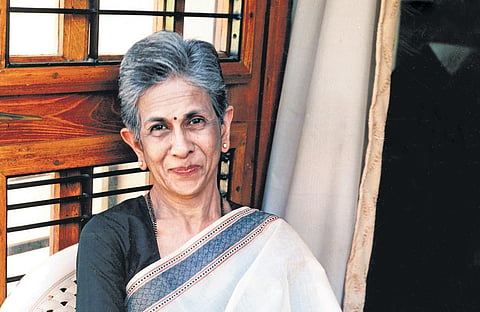

Have you always seen yourself as a writer?
No, I was only a voracious reader. I moved very imperceptibly into writing, using pen and paper to say what I had been saying to myself in my head.
You started writing at 30, I believe. What has been your inspiration as a writer?
The books I read, the authors I admired, and above all, people who have always fascinated me. Also, life, which is so unpredictable and so interesting.
Your novels are largely women-centric. Have you ever felt that this limits the range of your work? Does it sometimes entail dismissing other voices in the same space?
All writers are limited in one way or another. They do not write about a class of people, but about particular individuals. A novelist, at least a good novelist, reaches the universal from the particular. Through one woman, one man, one family, a novelist can evoke the world. Besides, let’s remember that men have been writing mainly about men for centuries. Women were on the sidelines, they were ‘written about’. I don’t see anyone asking men why they write, only or mainly, about men, or calling their writing ‘limited’. When, in fact, women constitute one half of the human race! It’s part of the denigration of women’s writing to call it ‘limited’. The trouble is that writing about women is somehow considered an aberration, if not a bad habit! Time we moved away from this way of thinking. Nobody can, or should, tell a writer what or who to write about. As for ‘dismissing’ voices, it is the most unlikely thing any writer will do. All the voices that are part of a novel will find a place in it. Finally, a writer is a writer; gender does not come into it.
How difficult or easy is it to get published in India?
I started publishing in the early 80s. Since then I have had no problems getting a publisher. I don’t know how it is now. I think it would be more difficult, what with an increasing number of people taking to writing.
Is feminism always confined to gender?
Feminism came out of a consciousness of the injustice done to females in many ways through the years. It came into being to try and redress these wrongs. Whether it’s the law, or social rules, or medicine, or religion, or customs and traditions, or women trying to find a place in the world—all of these went against women. Feminism did not deal with one particular wrong, like the Suffragettes who fought for the vote. It can’t be called being ‘confined’, because it is a movement whose spread is wide; it embraces many issues which affect women and is connected to every aspect of women’s lives.
How has women’s writing changed in India?
It’s not just women’s writing, all writing keeps changing; it can never remain static. Themes change, narrative styles change, etc. What is distinctive about women’s writing is that though it began not very long back, it is now very confident. And in India, compared to earlier years, there are a lot of women
writing. There’s good writing as well as bad writing, serious writing as well as commercially slanted writing.
Who is your first reader? And who are your biggest critics?
My first reader is always my husband. As for critics, the really obnoxious ones are those who bring in the personal and inject malice into the review.
Would you consider writing from a man’s point of view?
If I get the idea of a male protagonist, why would I not write a novel from his point of view? To a writer, people are ultimately just people. But the protagonist must be someone you come to know very well. Inside, and out. It doesn’t matter whether it’s a male or a female. Anyway, aren’t we making too much of gender? A writer writes what comes to her/him. A novel can only be judged by whether, or how, it touches the reader.
SHORT TAKES
What are you reading now?
Growing Up Karanth, a biography of Kannada writer Kota Shivaram Karanth
Your favourite authors.
Jane Austen, Charles Dickens, Anne Tyler, Ann Patchett, Marilynne Robinson, Margaret Atwood, PD James
Your favourite reading nook.
A peaceful place, and a comfortable chair. And, of course, reading in bed at night after all chores are done.
Had you not been a writer...
I can’t imagine myself as anything other than a writer.
A book you wished you had written.
Wuthering Heights by Emily Bronte, Persuasion by Jane Austen, and Howards End by EM Forster.
Subversions: Essays on Life and Literature
By: Shashi Deshpande
Publisher: Westland
Pages: 296
Price: Rs 599